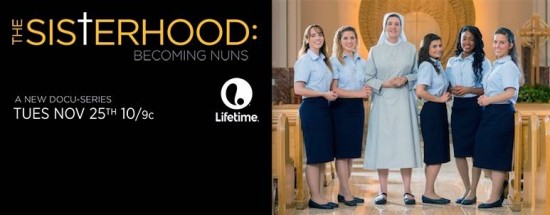Father James Martin is a very kind man and a joyful priest who loves his vocation and will tell you that priestly celibacy is a discipline and gift that has enabled him to form deeply intimate, lasting friendships with with all kinds of people — friendship that, removed from the flesh and the material, is free to seek out the God-element in each person, and to love with the mind of Christ.
Many of my celibate friends feel similarly, whether they are priests, religious or layfolk. Their celibacy, freely embraced and honored, encourages them to find other routes to love and that mindful seeking ends up forging deeply nourished roots of joy. It’s a palpable joy — you can see it in the shine of their eyes — it is a joy that attracts, and if there was no value to it, someone had better tell these Benedictine and Dominican and Passionist and Franciscan Nuns before they make their final vows, about which they seem rather deliriously happy. Someone should tell this Jesuit priest that he’s miserable. Or this Franciscan one; or this Cardinal.
So I was very glad to see Martin deal a smackdown — a gentle one, because he is a gentleman, but a smackdown nonetheless — to Bill Keller of the New York Times, who soundly deserved it for this ill-informed, intellectually lazy, unsurprisingly adolescent attempt to analyze the value of celibacy.
I read Keller’s piece and wondered why he feels so bothered by the idea of celibacy that he wants to make it go away — at least Christian celibacy; he seems to have no problem with Buddhist celibates. No one is trying to make him celibate; priests and religious go into their vocations quite aware that celibacy is part of the bargain, and that it’s not an empty trade-off, but a means to other sorts of riches. pursue their vocations quite willingly,
Still, I want to address one point Keller tosses off as fact, based upon nothing at all: “The apostles had wives.”
To echo Martin, “Really? Peter did–but all of them? Guess I missed those mentions of Zebedee’s daughters-in-law.”
Not only do we not hear about the wives of the apostles, we don’t actually hear about Peter’s wife, either. We know Peter was married because the Synoptic Gospels tell us so; Matthew, Mark and Luke all recount a visit to Peter’s house, where his mother-in-law was down with a fever. Christ Jesus healed her and she immediately got up and waited on them.
A detail many miss is that had Peter’s wife been around, she would have been mistress of the household, overseeing the comfort of Peter and his guests. Instead, it is the mother-in-law who, once healed, takes charge of the hospitality.
This suggests to me that Peter was very likely a widow. At some point he brought his mother-in-law into his home — possibly upon her widowhood, but perhaps even before — and upon the death of his wife it would have been a natural thing for this woman to manage the household for her daughter’s husband. Jesus healed her, and then she got up and served, very likely because she was needed to serve.
In the gospels Martha and Martha are always mentioned together; when Our Lady stands at the cross of her son, we read that Mary [the wife] of Clopas and Mary Magdalene were there, as well. It is not unreasonable to think that had Peter’s wife been around when Jesus came to visit, we would read that his mother-in-law left her sickbed and — with Peter’s wife — served them all.
Her going unmentioned suggests Peter’s widowhood, and means it’s fair to assert that during time with Christ Jesus, his participation in ministry and subsequent priesthood, Peter was unmarried, and celibate.
UPDATE:
In the comments section, some are grousing about celibacy when it is “enforced” rather than being taken up voluntarily. Margaret Rose Realy has some thoughts about that.













